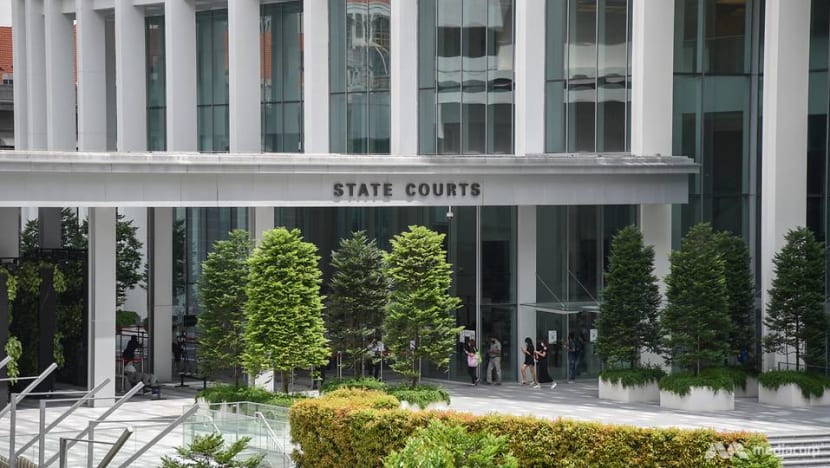Businessman accused of buying S$6 million worth of property through Singaporeans still at large in China
Zhan Guotuan absconded from Singapore in 2017 and has not returned to face his charges since.

File photo of the State Courts in Singapore. (Photo: CNA/Calvin Oh)
SINGAPORE: A foreign businessman who faces pending charges over the S$6.25 million purchase of three restricted landed homes in East Coast is still at large after absconding in 2017 and is believed to be in a hospital in China.
A district court on Wednesday (Feb 1) held that the arrest warrant for Zhan Guotuan, 58, is to remain, despite the defence arguing that it should not continue to stand.
Zhan, who is a China national and Singapore permanent resident according to charge sheets, faces three charges under the Residential Property Act.
He is accused of authorising two people and one company to purchase restricted residential property in 2007 and 2008, with the intention that the three properties be held in trust for him.
The two co-accused are Singaporeans Tan Hui Meng and Guan Aimei. Tan is on trial for his involvement, while Guan has been sentenced.
Tan allegedly bought two of the houses in the East Coast district in his own capacity and as the director of Hwampoa, a locally incorporated company.
Tan also allegedly aided Guan in buying the third property.
All three properties were purportedly to be held in trust for Zhan. Zhan allegedly planned to buy all the houses on that stretch of East Coast Road and redevelop the land into a condominium.
Restricted residential properties include vacant residential land, terrace houses, semi-detached houses, bungalows and shophouses, among others.
The criteria to own restricted property includes holding permanent residency for a least five years and making "exceptional" economic contribution to Singapore, according to the Singapore Land Authority's website.
The three properties were bought for the price of S$1.55 million, S$2.3 million and S$2.4 million respectively.
According to the prosecutor, Zhan absconded in 2017 after he was granted permission to leave Singapore to go to Indonesia.
Without obtaining permission from the court, he returned home to China and has remained there since. However, he is still in touch with his lawyers.
Ms Poon Pui Yee from Harry Elias Partnership told the court that her client could not return to Singapore as he has been in hospital.
Zhan purportedly suffers from bipolar disorder and had sought to leave Singapore in the first place to seek medical treatment.
Ms Poon argued that the arrest warrant for Zhan should not continue to stand.
She said Zhan is currently warded in hospital, referring to a medical report dated January 2023, and is unfit to travel.
She said he has remained hospitalised for more than a year since November 2021 and is still not in a condition to travel to Singapore to attend court.
She said that Zhan has remained in contact with his lawyers, giving them his instructions and making restitution of S$2.3 million.
"He had always indicated that he wanted to plead guilty at the pre-trial stage," said Ms Poon.
"On that basis, we don't think it's justified for a warrant to arrest to be against him, given that his location is known."
Deputy Public Prosecutor Louis Ngia said that Zhan had absconded in 2017 and the defence had been given multiple chances since then to secure his attendance.
Mr Ngia said the records show that Zhan has been in and out of hospital on several occasions, even remaining discharged for three months on one occasion.
He was warded again because he refused to take his medication and relapsed, said Mr Ngia.
"Ultimately, the accused faces multiple charges. The defence has had five years. The warrant of arrest should stand. There are no reasons to set it aside," he said.
District Judge John Ng agreed that the warrant is to stand, as Zhan cannot confirm when he is able to return to Singapore to attend court.
The initial warrant was issued because he breached his conditions of bail as well as conditions allowing him to leave jurisdiction.
The conditions specified that he was not allowed to go back to China, but he did so after going to Indonesia for business, said Judge Ng.
He fixed a further review of the case in six months' time.
The penalties for each charge of authorising a Singaporean or Singapore-incorporated company to buy restricted residential property under the Residential Property Act are a jail term of up to three years, a fine of up to S$50,000, or both.














